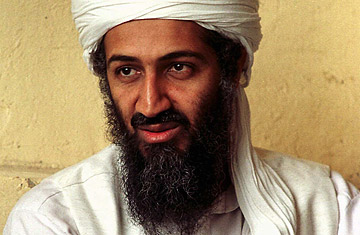
Osama bin Laden in Afghanistan, in an April 1998 file photo
(2 of 6)
By various accounts, the relationship between bin Laden and his mother was strong. "She loved Osama very much, as he was her only child," recalls Alia's brother Mohammed Ghanem. Bin Laden, according to friends, was devoted to his mother. During his exile in Afghanistan, he regularly phoned her in Saudi Arabia, calls that were bugged by the National Security Agency. In December 2001, as U.S. forces closed in on what was thought to be bin Laden's redoubt in the Tora Bora mountains of Afghanistan, his half brother Abdullah Mohammed told London's Sunday Telegraph that Alia was "devastated" by the developments. She was prescribed tranquilizers, he said, and had become a recluse in her apartment.
Eventually Mohammed bin Laden settled in Jidda, on the Red Sea coast, a cosmopolitan city by Saudi standards. He kept each of his wives and their children in a separate house within one compound. The boys were put to work early in the family business, the Saudi Binladin Group, today a billion-dollar concern with a global reach. "They don't spoil their sons as other merchant families in Jidda do," says Jamal Khashoggi, a veteran Saudi journalist who knows the family. With great pride, Osama once told Hamid Mir, editor of the Daily Ausaf, an Urdu newspaper in Islamabad, that he was the only child who traveled with his father on business. The young bin Laden was especially interested in the company's renovations of the sacred Prophet's Mosque in Medina.
Bin Laden preferred getting his hands dirty to hanging around the Binladin Group boardroom. "He told me that he used to enjoy riding tractors himself, not as a big boss but as a laborer," says Khashoggi. Bin Laden was always earthy. His relatives in Jabaryoun recall that on his summer sojourns he loved to go hiking and mountain climbing, to hunt and ride horses. In Saudi Arabia, he would go camping with his school chums. "He was the type who likes the desert," says Khashoggi.
When bin Laden was 10, his father, whom he worshipped, died in a plane crash. "He was so sad," recalls a relative in Jabaryoun. "It took him so long to overcome this tragedy." Talking about it to Hamid Mir years later, bin Laden was stoic. "It was very tragic news for me," he told Mir, "but I heard it with a lot of patience."
So close were the bin Ladens to the Saudi royal family that upon Mohammed's death, King Faisal began supervising the rearing of the bin Laden children until the oldest son, Salem, could take over. Osama's mother married another Jidda businessman, with whom she had more children, and she and Osama moved out of the bin Laden compound. While many of his half brothers were educated in the West, Osama, the young traditionalist, stuck close to home, attending high school in Jidda. Some reports have suggested that as a young man he caroused the nightclubs of Beirut. Khashoggi dismisses those rumors: "He was not like that. He was very strict." The cosmopolitan world, it seemed, never interested bin Laden.
On one of his visits to Jabaryoun, "a love story developed" between bin Laden and his first cousin Najwa, according to the girl's brother Naji, now a schoolteacher. The couple wed when bin Laden was 19 and Najwa 13. Young brides and marriage between cousins are not uncommon in the Arab world. "They were so happy at that time," says Naji. The next year, their first child, Abdullah, was born.
In keeping with his piety, bin Laden kept his life basic, despite the small fortune he had inherited from his father. He bought a modest two-story house in north Jidda and used the bottom floor as an office and the top for family quarters. He had an eccentric attachment to simplicity. Friends recall that he once knocked a rough hole through a wall in order to connect two rooms together, then hung a curtain from two nails for a door. When friends suggested he get someone to smooth out the edges and install a real door, he took them by the hand and walked them from one room to the other to demonstrate that the hole served its purpose. "But it could be nicer," his friends said, to which bin Laden replied, "There is no need for that."
If the seeds of fanaticism were already present, they began to sprout when bin Laden attended college. He enrolled to study business administration at King Abdulaziz University in Jidda but was soon distracted. It was in Jidda where he apparently first encountered the man who would become his second father figure.
Abdullah Azzam, an Islamic scholar at the university who was bin Laden's senior by 16 years, was a Palestinian radical whose interest in the Palestinian cause had shifted because of its narrow, nationalistic focus. Azzam was a pan-Islamist, dedicated to uniting the entire Muslim world in a pure Islamic state through holy war. A follower of the mainstream fundamentalist movement the Muslim Brotherhood, Azzam had a magnetic personality, and his ideas, which were just coming into fashion at the time, inspired bin Laden.
When the Soviet Union invaded Afghanistan in 1979, Azzam sped to the front to help his fellow Muslims — the rebel Afghans known as the mujahedin — confront the infidel invaders. In the Pakistani border city of Peshawar, Azzam cut a distinctive figure in his flowing robes and checkered kaffiyeh headdress; his addresses at the Lajna Aldawat Mosque drew overflow crowds. Bin Laden dropped out of school and followed Azzam. In Peshawar, they ran an agency called the Maktab al-Khidmat (the Service Office), which provided assistance to the so-called Arab Afghans, Arab volunteers who showed up to help the mujahedin. Bin Laden, using his family connections in Saudi Arabia, was the chief fundraiser.
